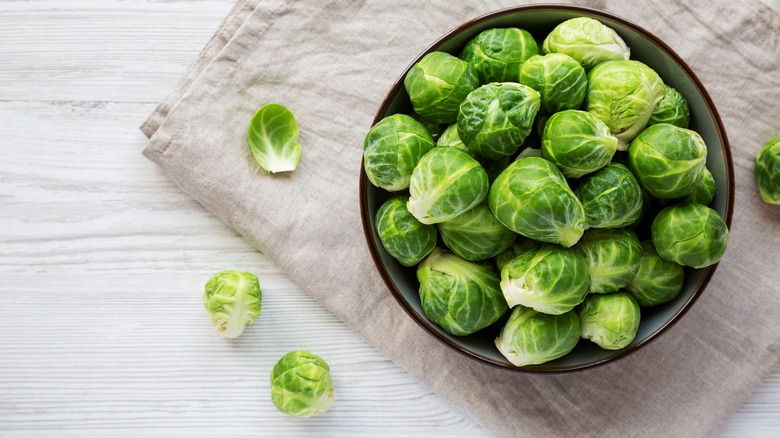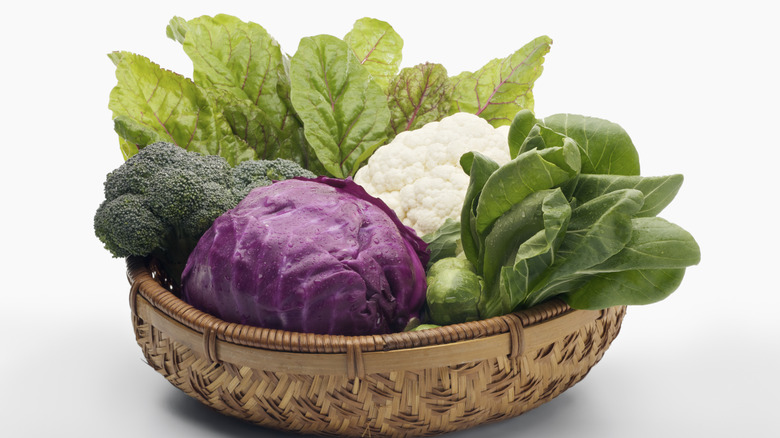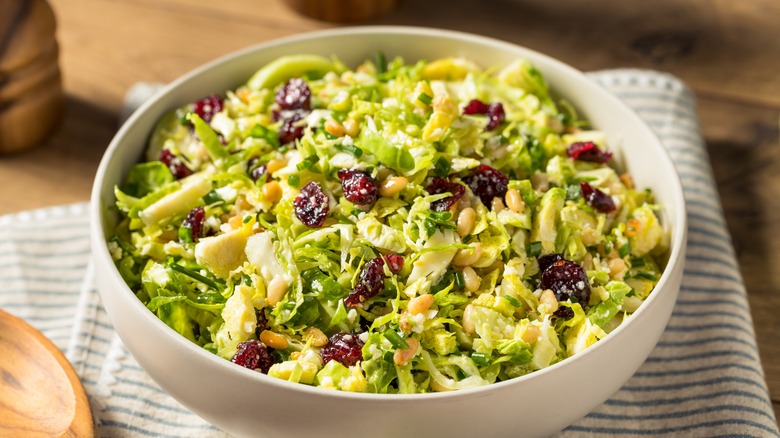What You Should Know Before Eating Raw Brussels Sprouts
It's hard to beat the caramelized crispness of roasted Brussels sprouts (perhaps with a maple-Dijon glaze), but these little green guys can also be eaten raw. They're delicious when shaved in a salad dressed with olive oil and lemon juice, to start. However, there's good and bad news with respect to eating raw Brussels sprouts, and this is due to compounds called glucosinolates, which are found in uncooked cruciferous vegetables.
The good news is that glucosinolates (which can be reduced through cooking processes like boiling) have a number of incredible health benefits. The bad news is for diners who have or are at risk for thyroid issues — glucosinolates reduce the body's absorption of iodine, so those with an iodine deficiency should probably avoid eating raw Brussels sprouts.
Iodine deficiency is the leading cause of thyroid disease — specifically hypothyroidism, or under-active thyroid. Studies conducted on male rats using rutabaga sprouts (another cruciferous vegetable like Brussels sprouts) showed enhanced effects of iodine deficiency in those with hypothyroidism. While we don't know if the human body reacts in exactly the same way, it's still prudent for people with hypothyroidism or an iodine deficiency to cook their Brussels sprouts.
The good news about glucosinolates
Raw sprouts may be off-limits for some, but for persons without an iodine deficiency or thyroid conditions, a diet high in glucosinolates can help stave off all manner of chronic diseases. These phytochemical compounds have been shown to have anti-inflammatory, antioxidant, and chemo-protective properties — and they're found almost exclusively in cruciferous vegetables. In addition to Brussels sprouts and rutabaga, arugula, cabbage, broccoli, cauliflower, bok choy, turnips, collard greens, and watercress are all in the Brassicaceae or Cruciferae family, so you've got quite a range to choose from.
The potential benefits of consuming glucosinolates (gleaned from tests conducted on humans as well as animals) is amazing: protection against cardiometabolic disorders and cancers of the prostate, liver, colon, and breast; improvement in cognition and memory as well as in symptoms of anxiety and depression; and increased bone strength and muscle fiber organization. Cooks who can enjoy Brussels sprouts raw may now be wondering how to get more of these green nutrition machines in their diets.
The joys of raw Brussels sprouts
Preparing raw Brussels sprouts for consumption isn't much different from preparing them for cooking. To start with, buy sprouts that are bright green (and preferably still on the stalk), remove any yellow or wilted leaves, and give them a good wash. Once they've been dried, you can shred your Brussels sprouts on a box grater, food processor, or mandoline and toss them in a salad.
Shaved Brussels sprouts salads can be made with a simple olive oil and lemon juice vinaigrette to more complex and tempting concoctions that can include anything from toasted pine nuts to apples, cranberries, sunflower seeds, and Parmesan cheese. Pair the sprouts with fruity pears and pomegranate for an extra-refreshing side dish or appetizer. Or, you can get even more adventurous and make a Brussels sprouts Caesar salad. No matter what you do, you'll be getting a whole lot of healthy glucosinolates along with a delicious dish.


